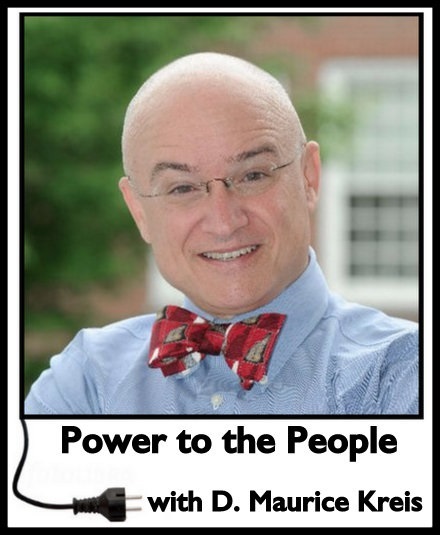Power to the People is a column by Donald M. Kreis, New Hampshire’s Consumer Advocate. Kreis and his staff of four represent the interests of residential utility customers before the NH Public Utilities Commission and elsewhere.
By DONALD M. KREIS, Power to the People
Hold on to your wallets, fellow residential ratepayers! The opportunists are coming, and they’re waving the flags of Texas and California.
By “opportunists” I mean those who make their money by forcing the rest of us to double down on their conventional approaches to energy problems. And by “conventional approaches to energy problems” I mean more high-voltage transmission lines, interstate natural gas pipelines, and natural gas generation plants.
This is the very opposite of a journalistic scoop. My evidence is the public testimony of an obscure but highly influential fellow named James B. Robb before the Senate Committee on Energy and Natural Resources on March 11.
Robb is president and chief executive officer of the North American Electric Reliability Corporation, otherwise known as NERC. An industry-organized nonprofit organization, NERC does something that in a better world would be the responsibility of public officials: “assure the effective and efficient reduction of risks to the reliability and security of the grid,” to quote the written version of Robb’s testimony.
NERC is the national reliability watchdog because Congress succumbed in 2005 to pressure from electric industry titans to let them self-regulate. The Energy Policy Act of 2005 directed the Federal Energy Regulatory Commission (FERC) to designate a national “Electric Reliability Organization” (ERO), defining ERO in a manner calculated to force FERC to give the job to NERC, founded in 1968 by electric utilities as the National Electric Reliability Council.
“Over the years, NERC’s assessments have continued to identify three areas of primary concern: California, Texas, and New England,” Robb told the Senate panel. Lost on absolutely no one was that 8,000 Californians lived through rolling blackouts during a heat wave last August – and, of course, record cold left millions of Texans shivering in the dark on Valentine’s Day and several harrowing days thereafter.
“New England’s exposure to extreme weather is exacerbated by its limited pipeline capacity to import gas and its dependence on a handful of critical fuel assets,” the NERC CEO said. “New England secures fuel reliability through duel-fuel capability in its natural gas fleet.”
“A cold snap in December 2017/January 2018 led to natural gas shortages and fuel oil was burned to preserve reliability,” Robb added. “If the cold front had not dissipated after January 8, several more hours of freezing weather would have exhausted the fuel oil in inventory and [regional grid operator] ISO-New England would have been forced into load shedding to preserve reliability.
“It was a near-miss event,” Robb warned.
What solutions does Robb suggest to avoid future near-misses? “More transmission and natural gas infrastructure is required to improve the resilience of the electric grid,” he testified. He characterized natural gas as “essential to a reliable transition” to a grid more reliant on “variable resources,” by which he means electricity produced by solar panels, wind turbines, and hydro-electric facilities.
This is not to trash Jim Robb or question the soundness of his analysis, although it does put me in the mind of a quip I heard recently from my former boss, director emeritus Michael Dworkin of the Vermont Law School Institute on Energy and the Environment, about the lunacy of putting 20 engineers in a room and expecting them to come up with a non-engineering solution to a problem.
Not only is Robb an engineer – he spent six years as an executive at Northeast Utilities (NU), leaving just before the merger that transformed it into Eversource. He was in charge of strategic planning at NU; among Robb’s achievements, according to his LinkedIn profile, was that he “developed several multibillion-dollar infrastructure projects that will lower the region’s carbon footprint, reduce customer costs, and build new profit streams.”
This is not to say that, in his capacity as CEO of NERC, Robb is guilty of opportunism or resistance to change. He most assuredly did not tell the Senate panel to build more fossil fuel generators and he didn’t even mention nuclear power.
In fact, he testified that “energy storage and will be a game changer.” He said that both energy storage and “a hydrogen production and delivery system” are essential “if the vision of a largely/completely decarbonized electric system can be realized.”
The real problem here is that the real opportunists are surely gearing up to use NERC’s analysis as an excuse to force the public to pay for new and overly generous subsidies to legacy generators of the fossil and nuclear variety as well as big bucks to transmission owners so they can gold plate the grid yet further. That’s what happened in the wake of the 2003 blackout and the so-called “Polar Vortex” (an evocative term that means “colder than average winter”) of 2013 and 2014.
“Many are discussing the merits of a national transmission system similar to the interstate highway system,” said Robb in his testimony. I’m sure they are.
The challenge, whether it’s Texas, California, or New England, is to identify our vulnerabilities with precision and then spend just the right amount of money on precisely the improvements we need to make the grid as reliable as it should be. In other words, to paraphrase a famous politican, let’s have all the grid we need but only the grid we need. Anything more than that will cost ratepayers too much money.






